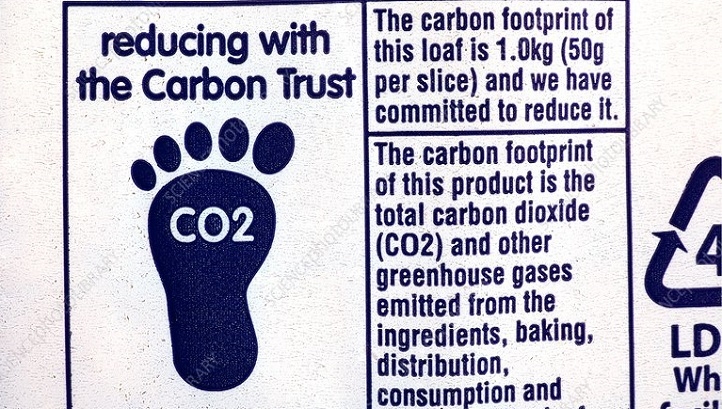A survey across seven countries has revealed the majority of people would like to see labelling related to the climate change impact of products they purchase.

A carbon footprint label, as found on a variety of food items
The study of 9,000 international consumers, commissioned by the Carbon Trust and produced by YouGov, found 67% wanted a ‘recognisable’ label that illustrated how a product was made with a commitment to measuring and reducing carbon footprint.
People across Canada, Italy, the Netherlands, Spain, Sweden, US, UK, were asked about how brands could take action on climate change, and alongside the majority supporting labelling, consumers also said they would “feel more positive” about companies that were making efforts to reduce the carbon footprint of their products.
Italy and Spain saw the highest levels of desire for carbon labelling, with more than 80% of respondents from both countries thinking it was a good idea. Sweden had the lowest proportion, where less than half – 49% – thought it would work.
The study also found that there was a value-action gap in consumers thinking about the issue though, as more than half – 52% – actually considered carbon footprint when buying a product. But a fifth of consumers disagreed with the comment they ‘do not think about carbon footprint’, suggesting that carbon did impact their purchasing decisions.
Transformative power
The Carbon Trust’s managing director, business services, Hugh Jones, said there was “real transformative power” in getting consumers to change their purchasing decisions to favour low carbon products – as highlighted in the Intergovernmental Panel on Climate Change’s report on 1.5C last year, which showed behavioural shift was required to mitigate the worst impacts of climate change.
“Consumers cannot make better choices without reliable information and as the research shows there is strong appetite to understand the climate impact of products. (Carbon labels) enables consumers to use their wallets to choose companies that are taking action on climate change.”
Label trials
The idea of carbon labelling has been around for some time. As early as 2008, Tesco launched a range of 20 products with the Carbon Trust badged with a Carbon Reduction Label, but dropped it in 2012 after other retailers failed to follow suit, as well as blaming the amount of work required per product to work out the carbon footprint.
One of the few companies to take action is Quorn Foods who has been displaying carbon reduction labels on their products since partnering with the Carbon Trust in 2012 to independently certify reductions in the carbon footprint of its products against the standard, PAS 2050. This was then communicated through the footprint label with reports also detailed in sustainability reports and on its website.
Sustainability manager at Quorn Foods, Louise Needham, said: “We remain committed to clearly communicating the sustainability attributes of our food to customers and consumers. In fact, in 2019 we will have assessed the carbon impact of around 50% of our products. We believe this is essential for ensuring credibility amongst key stakeholders; particularly as food choices are increasingly acknowledged as being fundamental to a 1.5C future.”
James Evison
